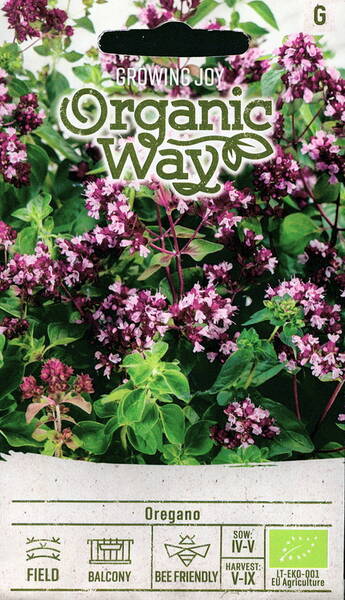Ex Tax: 1.25€
Three in one: decorative, spicy and medicinal crop.
Perennial herbaceous plant of the Lamiaceae family up to 80 cm high with a strong aromatic smell. Good honey plant. Very decorative.
Prefers light, well-fertilized soils. Blooms in July-August, prefers sunny places and dry, neutral soil.
In folk medicine, infusions and decoctions are used as a sedative, for colds, as an antibacterial agent.
Seeds are sown in early autumn or in May to a depth of 0.5-1.0 cm. Seed consumption is 0.4-0.5 g per 1 m2.
1.0 g = 7000-8000 seeds.
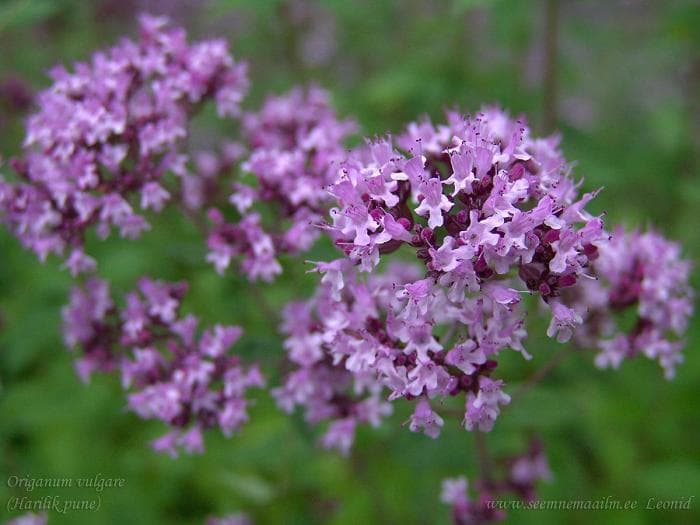
Agrotechnics.
At the beginning of development, the crop is demanding of heat, therefore in the conditions of Northern Europe it is better to use the seedling method of propagation. With this method, seeds are sown at the end of April at the rate of 0.1 g of seeds per 100 plants.
Seedlings are planted in open ground after June 5 with a row spacing of 60 cm and a distance between plants of 40 cm.
Oregano grows slowly, therefore in the initial period the soil is kept clean from weeds. In subsequent years, it does not need special care.
The row spacing is processed 2-3 times during the growing season.
The harvest (flowering and leafy parts of the plant) is collected during the flowering period.
It is advisable to grow oregano in one place for no more than 3 years. With further cultivation, it grows out and the yield of aromatic greens decreases sharply.
Green shoots, leaves and flowers of common oregano have a sharp spicy taste and a unique aroma. They are used for pickling vegetables and mushrooms, for flavoring tea, and for making kvass and home-brewed beer.
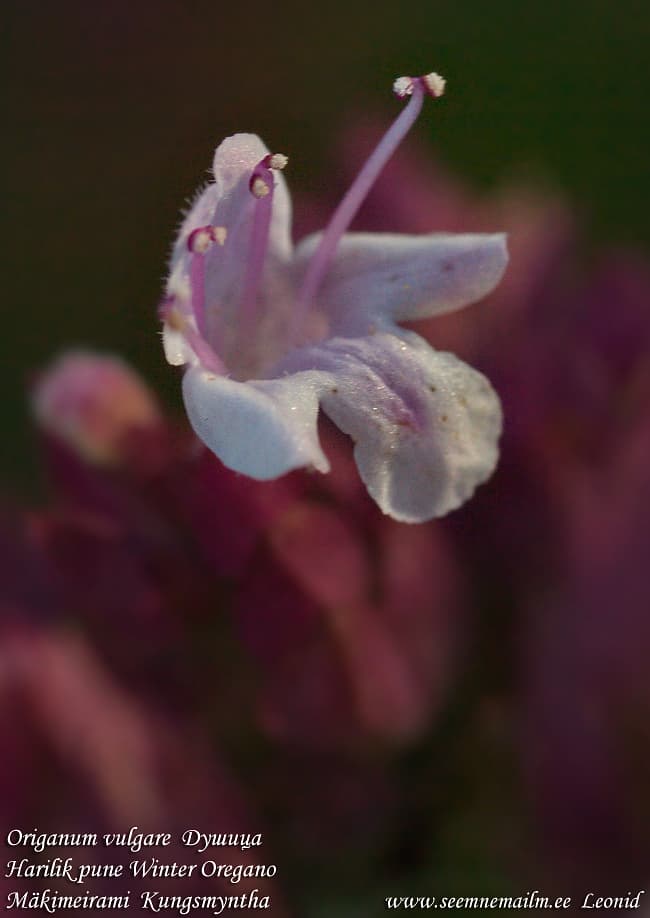
* It is impossible to imagine a real Neapolitan pizza without this spice. It is also added to soups, mushrooms, meat and sausages.
The leaves and inflorescences of this plant contain essential oil, tannins, pigments and ascorbic acid. The seeds contain fatty oil.
In medical practice, oregano infusion is used as a means of stimulating appetite and improving digestion, calming the central nervous system, as an expectorant for acute chronic bronchitis, whooping cough, as a diaphoretic for colds.
In folk medicine, it is used for rheumatism, paralysis, as a means of improving the functioning of the gastrointestinal tract, and also as a diuretic.
Externally, in the form of lotions and baths, oregano is used for pustular skin diseases and diathesis, as well as a means for healing wounds.
Young leaves are used in food in fresh and dried form. For medicinal purposes, oregano herb is used - the upper parts of the shoot with fully blossomed flowers.
Note that ... fresh and dried leaves are used as a seasoning for meat dishes, potatoes, beans, peas, and salads.
Oregano herb is used for medicinal purposes as a strong diuretic, it improves digestion and intestinal peristalsis in atony.
Oregano is recommended as a light antiseptic and tonic for taking baths.
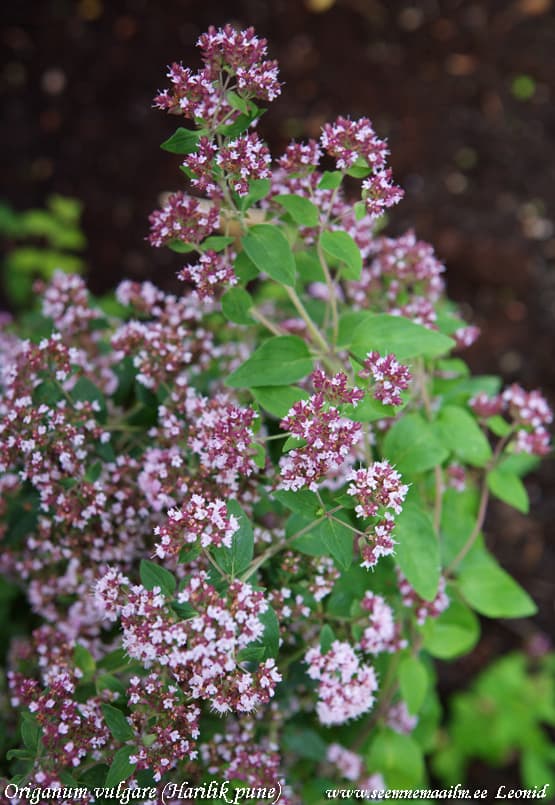
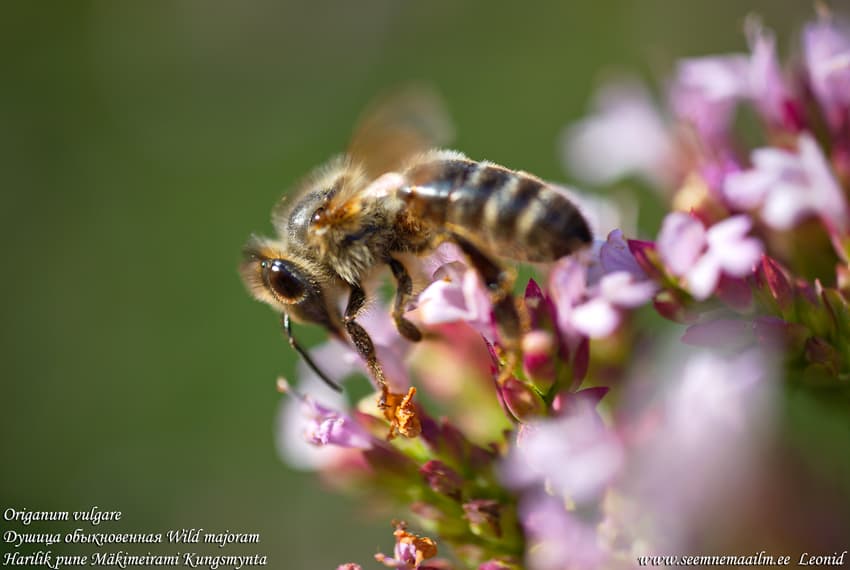
European oregano, Oregan, common marjoram, joy of the mountain, Turkish oregano, wild oregano, winter oregano, wintersweet. Bot. syn.: Origanum creticum L.
Did you know that... the leaves for seasoning are collected before flowering and used fresh and dried, storing them in tightly sealed jars.
The herb for medicinal purposes is harvested in the mass flowering phase and dried in the open air in the shade, tied in bunches or laid out in a thin layer on paper.
Stored in glass jars for up to 3 years.
* Oregano was mentioned by Dioscorides and Avicenna in recipes for the treatment of the stomach and liver, joint diseases.
Oregano herb has anti-inflammatory, analgesic effects, improves blood circulation and digestion, increases appetite, eliminates neuroses and increased irritability, helps to restore strength. Along with marjoram, it is actively used in cooking.
Common oregano is sold in pharmacies under the name Origani herba, in a herbal mixture of dried leaves, flowers and parts of inflorescences.
Application.
Used for colds, headaches, whooping cough, gastritis, for the treatment of women's diseases, treatment of insomnia, neuralgia, to strengthen hair, etc.
Oregano tea.
Dry oregano herb is infused in boiling water for 15 minutes in the proportion of a tablespoon per glass, then strained.
Oregano tea is used for any stomach problems, liver and lung diseases, reduces convulsions, dizziness and nausea, prevents the development of cataracts, periodontal disease, is very popular in geriatrics (anti-aging), increases appetite, restores strength, relieves stress, improves mood. But you should not get too carried away with it, since you can get temporary headaches, so you need to observe an interval of at least 5 hours between tea parties.
Oregano infusion.
In an enamel bowl under a lid, oregano herb is heated for 15 minutes in a water bath (2 tablespoons per glass of boiling water). Let the infusion cool for 45 minutes, then strain, squeeze out the grass, and bring the volume of the infusion to a full glass with boiled water.
Taken for constipation, intestinal inflammation, excessive gas formation, gastritis with low acidity, recommended for nervous overexcitement, insomnia and hypertension as a sedative. Drink half a glass of warm infusion twice a day 15 minutes before meals.
Infusion to enhance intestinal peristalsis.
Pour a glass of boiling water over 2 tablespoons of oregano, leave in a closed container for 2 hours, strain. Drink 1 tablespoon of infusion three times a day, half an hour before meals. The infusion improves digestion, increases appetite, and is an expectorant for colds.
Oregano decoction.
A glass of boiling water and 1.5 tablespoons of common oregano, leave for 15 minutes, then boil for 5 minutes on low heat, leave for another 45 minutes, strain, squeeze. Take 0.5 tablespoons three times a day before meals, for gout, rheumatism, kidney disease, inflammation of the esophagus, gastritis with low acidity. For diaper rash, boils, abscesses, allergies, tumors, the decoction is used in the form of lotions and compresses: 1 tablespoon of the decoction is diluted in a glass of water.
Headache remedy.
Boil a tablespoon of oregano in a glass of boiling water for 3 minutes. Wash your head with a warm decoction, trying to rub it into the roots of the hair, wrap your hair in a terry towel for 30 minutes. An excellent remedy for migraines, it also softens and strengthens hair, gives it shine.
Oregano powder.
Crushed flowers and dry leaves of oregano are sniffed for runny nose and headaches.
Oregano tincture.
Oregano herb 10 g (2 tablespoons) is poured with 150 ml of 70% alcohol, shaking periodically, insist in a dark place for 7-10 days. Then filter, pour into a bottle of dark glass.
Take as a sedative 30-40 drops in a quarter glass of boiled water, three times a day half an hour before meals, for insomnia, hysteria, atherosclerosis, menopause, nervous tension.
Oregano oil.
Oregano oil is a powerful antioxidant that stimulates blood circulation well and has an antimicrobial effect.
To prepare the oil, pour a glass of sunflower or olive oil over a handful of dry oregano, leave in a warm place for a week and strain through a gauze napkin.
Oregano oil is an excellent rub for rheumatic pain in the joints, for cellulite. Add 3 drops of oregano oil to 15 g of any carrier oil.
For asthma, bronchitis, severe cough - hot inhalations for 3-5 minutes, 2 drops per liter of boiling water. Menstrual irregularities - 2 drops of oil in a basin of warm water, sitz bath.
Oregano is used externally in the form of compresses, lotions and medicinal baths. Medicinal baths with oregano are used to heal wounds, as a general tonic and a good antiseptic.
Medicinal baths with oregano have a calming effect on the nervous system, are used for gynecological diseases, diathesis, itchy skin rashes, abscesses, furuncles (dry oregano is poured with boiling water at the rate of 100 g of herb per 3 liters of water, infused for 3 hours and filtered).
Another option: oregano herb 50 g per 10 liters of water, boiled for 10 minutes and filtered. The resulting infusion or decoction is added to a bath filled 2/3 with warm water.
For a children's medicinal bath, 2 tablespoons of dried oregano flowers are infused for 20 minutes in 2 liters of boiling water, strained and the infusion added to the bath for bathing. It is recommended to bathe rickety babies (or with allergic disorders) in such an oregano infusion 2 times a week. A relaxing bath has a calming effect on the nervous system and is good for everyone: mix a tablespoon of oregano and oatmeal, tie it in gauze and throw it into a bath filled with water.
Contraindications: oregano is strictly prohibited during pregnancy, oregano herb has an abortive effect. You cannot take oregano if you have hypertension and cardiovascular diseases, increased gastric secretion, gastritis with high acidity, stomach ulcers, duodenal ulcers, intestinal, hepatic and renal colic.









